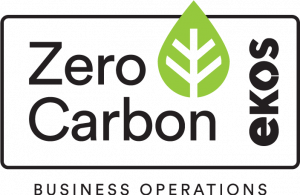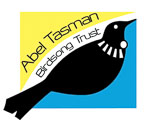Sustainability
We’re certified Zero Carbon and make a contribution to conservation in the Abel Tasman on behalf of every passenger.
Host Responsibility and Environmental Policy
We are deeply committed to providing our customers with a quality experience. At the same time, we will ensure our business operations have the minimum impact on the environment and our community. We will enhance and influence positive changes in our local community and the natural environment. The long-term sustainability of our business is directly connected to the sustainability of our community and environment.
Environmental Commitments
Carbon Footprint: Our business operations will have a net zero carbon footprint.
Ecological Restoration: We will contribute to the ecological sustainability of our local environment.
Waste Management: We will minimise the waste resulting from our daily business operations.

Carbon Footprint
Our business operations will have a zero carbon footprint
We have been a zero carbon business since 2018.
We started our journey towards becoming carbon neutral by identifying the largest contributors to the carbon footprint of our business operations: (1) The petrol and diesel required to power our water taxis, tractors, buses and other company vehicles; (2) The electricity and LPG required to run the energy using equipment in our buildings; and (3) The waste created by our daily business operations, particularly the waste generated by our guests at the Marahau Beach Camp.
Our next step was to minimise, to the greatest extent possible, the largest contributors to our carbon footprint. This included the implementation of a range of fuel and energy saving initiatives including the use of the highest efficiency four-stroke outboard engines on our water taxis, installation of digital fuel gauges and the establishment of our own, in-house maintenance workshop. We also began retrofitting high efficiency LED lighting to our buildings and established recycling processes that dramatically reduced the amount of waste we are sending to landfill.
For the year from 1 April 2017 to 31 March 2018, we succeeded in reducing our emissions by 10.7% whilst still growing our business and contributing to the local community and economy.
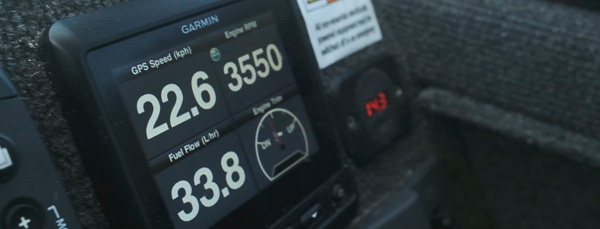
Our first year of being zero carbon certified was the financial year from 1 April 2018 to 31 March 2019. In that first year and since that time we have gathered all of the data required for Ekos to calculate our scope one and two carbon footprint in tCO2-e (equivalent tonnes of carbon dioxide). This includes the following businesses: Abel Tasman AquaTaxi, Marahau Water Taxis, Marahau Sea Kayaks, Marahau Beach Camp, Abel Tasman Centre and Hooked. These calculations were then certified by an external expert. Our total carbon footprint for all of our businesses for the most recent financial year, from 1 April 2022 to 31 March 2023 was 621.44 tonnes. To offset this carbon footprint we purchased certified Ekos carbon credits. These carbon credits are Indigenous forest VERs (Verified Emissions Reduction Units) certified to the Plan Vivo standard. These offsets were obtained from the Babatana Project in the Solomon Island and are retired on the Markit Environmental Registry.
A Fit-for-Purpose Business Model
Offsetting our emissions doesn’t mean we can take our eye off the ball when it comes to reducing our carbon footprint. Reducing our carbon footprint is a journey of a thousand steps rather than any one silver bullet but a really important enabler of this journey is a business model that is scaleable to demand. For us, that means having the right number of boats on the water at the right time.
The Abel Tasman visitor sector is extremely seasonal and that means for the vast majority of the year, we operate well below our full capacity. By running smaller boats, we can scale our services up and down depending on the number of passengers. This applies to both the seasonal nature of our business and even different departure times. This is what engineering nerds call the modular or demand-matching approach to efficiency but put simply – it just means we’re using less fuel by only running boats when we need them.

Ecological Restoration
We will contribute to the ecological sustainability of our local environment.
Before it became a national park in 1942 the Abel Tasman was subjected to farming, tree felling and burn-offs by early settlers. Over the past 20 years, efforts to restore the native ecology in the Park have intensified and the Abel Tasman has been lauded as a restorative success story. Thousands of exotic trees and plants have been killed allowing the native bush to regenerate.
There have also been aggressive and ongoing programs throughout the Park to eradicate the pests that predate our native birds. As a result, the resident birdlife has also flourished and several species of rare native birds such as kākā, kākāriki and pāteke have been reintroduced to the Abel Tasman.
The organisations primarily responsible for this progress are the Abel Tasman Birdsong Trust, Project Janszoon and the Department Of Conversation. Our contribution to this ecological restoration work is therefore through our financial and logistical support of these organisations.
The Environmental Access Fee (EAF) is the portion of your ticket price that goes directly towards preserving the unique environment you will enjoy on your Abel Tasman excursion.

Waste Management
We will minimise the waste resulting from our daily business operations.
We have taken every practical step to reduce the amount of waste that results from our daily business operations. We have recycling stations at all of our operating bases for our own waste and the waste generated by our customers.
We purchased a custom-built recycling trailer to improve our ability to collect and keep recyclable materials separate from other waste. This trailer was purchased before the 2017/18 summer and since that time, has been on location at the Marahau Beach Camp. Recyclable waste is also collected from each of our operating bases and is then transported to the Motueka Recycling Centre. In its first season of use we decreased the amount of waste going to landfill by 59%. We recycled 5 tonne of glass and 2 tonne of cardboard.
In 2018 we invested in a new state-of-the-art wastewater treatment system for our new water taxi and kayaking base in Marahau. This system is designed to meet the stringent new wastewater standards.
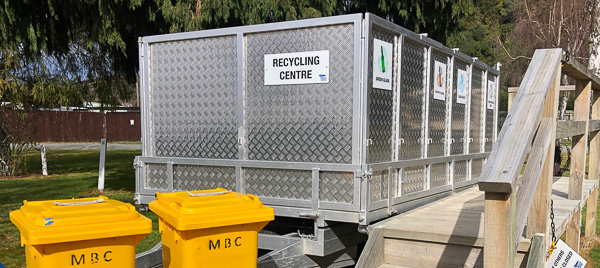
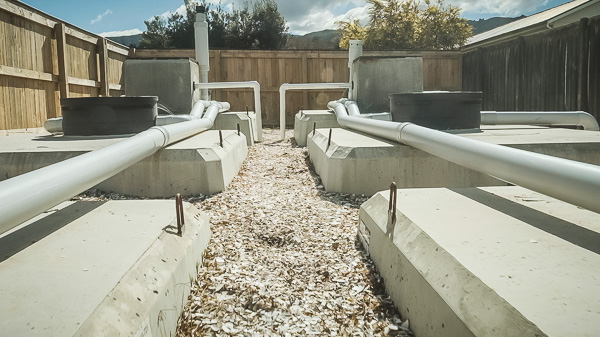
Social Commitments
Community Support: We will actively support the wellbeing of our local community.
Education & Engagement: We will actively engage visitors and our local community on the importance of resorting, protecting and enhancing our natural environment.

Community Support
We will actively support the wellbeing of our local community
We sponsor a number of local community and sports groups such as the Riwaka Rugby Club, the Kahurangi Division 1 rugby team, and the Riwaka Bowling Club. We also support local schools, clubs and community groups by providing travel vouchers and merchandise for their fundraising efforts.
During the peak summer visitor season we provide employment to more than 70 people. We actively promote a happy, healthy and safe work environment. We have a robust group-wide health and safety system and a manager responsible for the program overall. Each business unit has health and safety representatives and we have a group H&S committee.
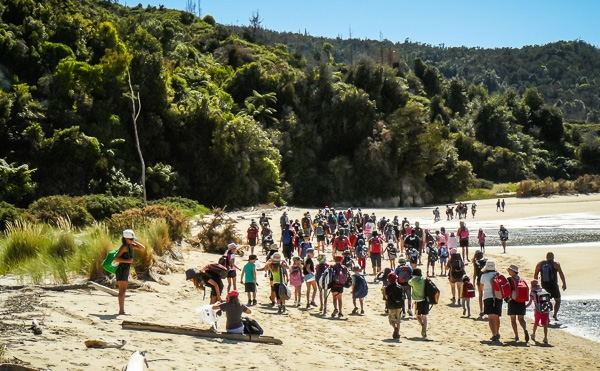
We offer heavily discounted water transport services for local schools and community groups to access the Abel Tasman National Park.

Education & Engagement
We will actively engage visitors and our local community on the importance of restoring, protecting and enhancing our natural environment
We love sharing our knowledge of the Abel Tasman’s flora and fauna and incredible success story of the restoration of the Park’s biodiversity and ecology. All of our water taxi skippers, kayak guides and other team members will share their experience and knowledge with our guests during their time with us. We’re also proudly showcasing the objectives and results of our own sustainable development program to our customers and other stakeholders through our digital communication channels and other promotional material.
We do everything we can to help every visitor to the National Park do so in a responsible and sustainable way. Every water taxi journey and kayak briefing includes instructions on how our guests can ensure they have no negative impact on the Park.


